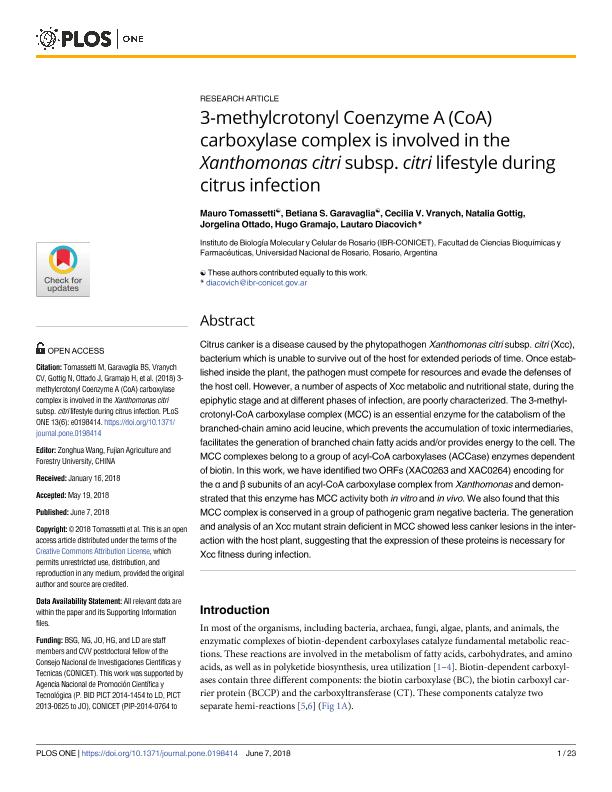Artículo
3-Methylcrotonyl Coenzyme A (CoA) carboxylase complex is involved in the Xanthomonas citri subsp. Citri lifestyle during citrus infection
Tomassetti, Mauro Ariel; Garavaglia, Betiana Soledad ; Vranych, Cecilia Verónica
; Vranych, Cecilia Verónica ; Gottig Schor, Natalia
; Gottig Schor, Natalia ; Ottado, Jorgelina
; Ottado, Jorgelina ; Gramajo, Hugo Cesar
; Gramajo, Hugo Cesar ; Diacovich, Lautaro
; Diacovich, Lautaro
 ; Vranych, Cecilia Verónica
; Vranych, Cecilia Verónica ; Gottig Schor, Natalia
; Gottig Schor, Natalia ; Ottado, Jorgelina
; Ottado, Jorgelina ; Gramajo, Hugo Cesar
; Gramajo, Hugo Cesar ; Diacovich, Lautaro
; Diacovich, Lautaro
Fecha de publicación:
06/2018
Editorial:
Public Library of Science
Revista:
Plos One
ISSN:
1932-6203
Idioma:
Inglés
Tipo de recurso:
Artículo publicado
Clasificación temática:
Resumen
Citrus canker is a disease caused by the phytopathogen Xanthomonas citri subsp. citri (Xcc), bacterium which is unable to survive out of the host for extended periods of time. Once established inside the plant, the pathogen must compete for resources and evade the defenses of the host cell. However, a number of aspects of Xcc metabolic and nutritional state, during the epiphytic stage and at different phases of infection, are poorly characterized. The 3-methyl-crotonyl-CoA carboxylase complex (MCC) is an essential enzyme for the catabolism of the branched-chain amino acid leucine, which prevents the accumulation of toxic intermediaries, facilitates the generation of branched chain fatty acids and/or provides energy to the cell. The MCC complexes belong to a group of acyl-CoA carboxylases (ACCase) enzymes dependent of biotin. In this work, we have identified two ORFs (XAC0263 and XAC0264) encoding for the α and β subunits of an acyl-CoA carboxylase complex from Xanthomonas and demonstrated that this enzyme has MCC activity both in vitro and in vivo. We also found that this MCC complex is conserved in a group of pathogenic gram negative bacteria. The generation and analysis of an Xcc mutant strain deficient in MCC showed less canker lesions in the interaction with the host plant, suggesting that the expression of these proteins is necessary for Xcc fitness during infection.
Palabras clave:
Citrus Canker
,
Xanthomonas
,
Carboxylase
,
MethylcrotonylcoA
Archivos asociados
Licencia
Identificadores
Colecciones
Articulos(IBR)
Articulos de INST.DE BIOLOGIA MOLECULAR Y CELULAR DE ROSARIO
Articulos de INST.DE BIOLOGIA MOLECULAR Y CELULAR DE ROSARIO
Citación
Tomassetti, Mauro Ariel; Garavaglia, Betiana Soledad; Vranych, Cecilia Verónica; Gottig Schor, Natalia; Ottado, Jorgelina; et al.; 3-Methylcrotonyl Coenzyme A (CoA) carboxylase complex is involved in the Xanthomonas citri subsp. Citri lifestyle during citrus infection; Public Library of Science; Plos One; 13; 6; 6-2018; 1-23; e0198414
Compartir
Altmétricas



